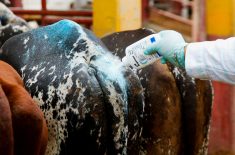The Manitoba government’s plans to retain ownership of carbon credits from on-farm projects it funds under new programs will be limited to the same scope as its funding contributions.
That’s according to the province’s general farm group, Keystone Agricultural Producers (KAP), which asked for clarification after it was noted that the terms of the province’s new programs grant it carbon credits based on the offsets created.
The province on Sept. 3 made application forms available for the Environmental Farm Action Program (EFAP) and Manitoba Sustainable Agriculture Practices Program (MSAPP), both part of its non-business risk management suite of programs under the federal/provincial Growing Forward ag policy framework.
Read Also

U.S. not ready to lift Mexican cattle ban over screwworm, Agriculture Secretary Rollins says
The U.S. is not yet ready to reopen its border to Mexican cattle amid an outbreak of the flesh-eating New World screwworm parasite, Agriculture Secretary Brooke Rollins said, but she is pleased with Mexico’s efforts to contain the pest.
The two programs provide support for on-farm implementation of best management practices (BMPs) that reduce environmental risks, improve environmental management on farmland and help reduce greenhouse-gas (GHG) emissions.
The application form requires an eligible farmer to agree that the carbon offsets, if any, created through the two programs’ incentives will be owned by the province in proportion to its project contributions.
“We interpret this to mean if they fund 70 per cent of a project, they own 70 per cent of the credits for the duration of the Growing Forward agreement — which is four years,” KAP president Ian Wishart said in a release this week.
During meetings with the province, KAP said, it lobbied for higher percentage funding amounts for farmers’ BMPs and considered that since the province was paying for a portion of the project, it could own the percentage amount of the carbon credit for the term of the program.
“Since there is currently limited value for credits and very limited market opportunities for trading, the higher percentage helps producers and the limited ownership of the credits helps the province,” KAP said.
“This provides the producer an opportunity for the first time to get real value for the carbon offsets they create. The dramatically higher percentage of funding in this round of BMPs and all of the extra funding under MSAPP is directly connected with the province’s desire to collect some of the agricultural offsets to meet their commitment to be ‘greener’ in government practices.”
Offset values
“By the time the Growing Forward agreement ends we hope a national offset system will be created,” said Wishart, who farms at Portage la Prairie and was one of the early proponents of Alternate Land Use Services (ALUS).
“At the very least, with a recovering economy, value will have come back to international offset markets,” he said this week.
In one of the province’s examples, MSAPP would pay 75 per cent of the project costs to convert sensitive lands from annual crop rotation to perennial forages, including the costs of establishment and restoration.
“Therefore, the province will retire the proportion of carbon credits associated with the provincial contribution to the project (75 per cent up to $15,000). The ownership period is the same as the project duration — up to the end of 2012. After this period, the producer will be free to make use of the offsets.”
In another example, MSAPP would pay 90 per cent of the costs of a cover system for a liquid manure storage site, up to $100,000. The province, in that case, would retire a 90 per cent proportion of the carbon credits available, and retain ownership of the carbon offsets for 10 years, after which the farmer would be free to use them.
For a third example, if EFAP puts up 50 per cent of the cost of a manure treatment project up to $150,000, the province would retire a 50 per cent proportion of the carbon credits and own the offsets for the duration of the project — which, in EFAP’s case, would be March 31, 2013.
“With the exception of lagoon covers, the percentage of funding provided will be the percentage of ownership by the province to the end of the program,” Wishart said.
“For MSAPP that is until the end of 2012; however, under (EFAP) it is to March 31, 2013, which is the end date for that program.”










